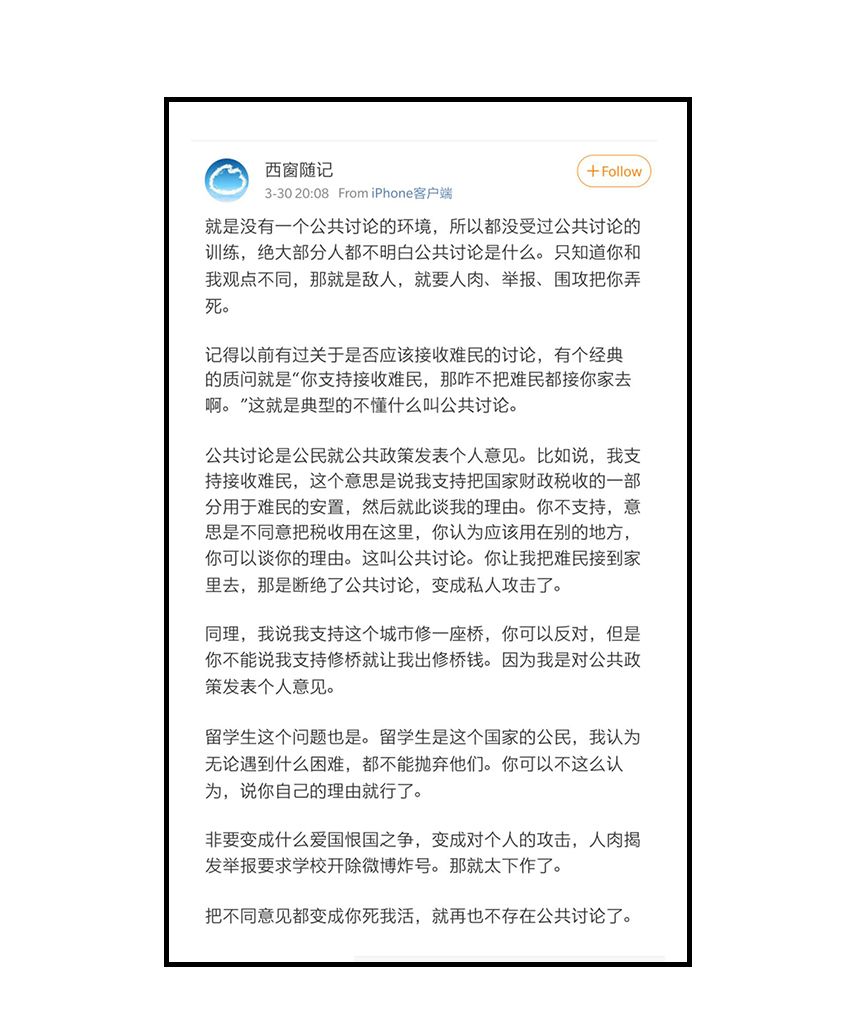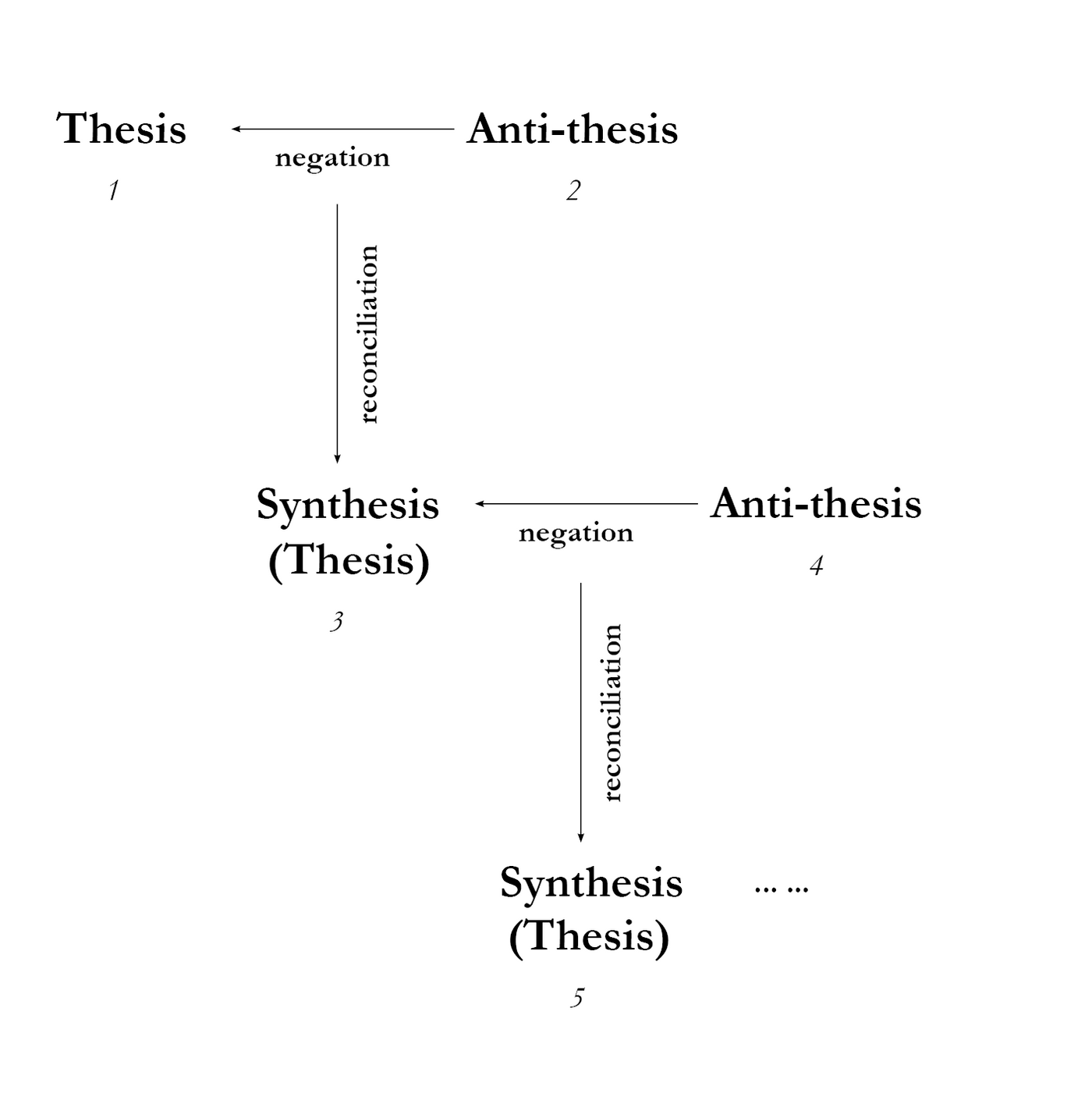
Hello~ 沙丘研究所(Dunes Workshop)是一个独立的线上原创内容发布平台,内容有关于城市、建筑、文学、艺术以及留学生活,成员来自哈佛大学设计学院以及麻省理工大学设计学院。 同样,欢迎关注我们的微信公众号“沙丘研究所”,第一手的推送内容会发布在这里;以及 Instagram账号@dunes.workshop 第一手的图像/视频内容将会发布在这里。
Even with a perfect public sphere, is "discussion" still impossible?

1. New questions
Even with a perfect structure, a perfect interactive platform, and a perfect "digital public sphere", is it still impossible for truly effective discussions to exist?
It can be said that this issue has broken through the discussion boundary of the previous article, from the basis of communication and political philosophy to the discussion of human nature itself and the possibility of language.
In the widely read article "The Death of "Discussion" in the Chinese Internet," the Dune Institute attempts to use the "public sphere" as a theoretical weapon to explain the restrictions on comments and comments on social media we use today, and by using the "public sphere" as a theoretical weapon It leads to the conclusion that the demise of effective discussion in the contemporary Chinese Internet is because the space for discussion has disappeared , and this is the more structural reason worth considering. Further, when people lose the place for discussion, they gradually lose the training for discussion, and they become more at a loss how to discuss.
The term "discussion" is not clearly defined in the article. But it can be read that the "discussion" refers to the discussion of public events. On this point, Weibo user "Xichuang Suiji" made a very vivid and down-to-earth explanation.

Others believe that no matter how hard we try, the so-called discussion is still impossible, because human beings are inherently arrogant and prejudiced animals, and opinions are bound to be constantly misunderstood and distorted. In fact, the "discussion" here has gone beyond the scope of "public discussion" and points to a more generalized language concept itself.
2. Respond to questions with the model of "Hegelian dialectics"
If the word "discussion" needs to be clarified, "Hegel's Dialectics" would be a good theoretical model. In fact, the word "dialectics" in this concept actually means "dialogue".
Like many other post-Kant philosophers, Hegel sought to continue what Kant had not done—to make philosophy a truly complete and systematic science. Specifically, one of the things he wanted to do was to find out what kind of ceiling (“the absolute idea”) could be reached by means of logical form. And what he calls "rational dialectics" is the method by which infinite things can be grasped. In this way, contradictory and conflicting things can be combined "to form a whole."
If we relatively simplify the "Hegelian dialectic" and extend this approach to many other categories, then it can be said that this model is a generalized deduction of almost any effective dialogue in human history.
In this model: First, one person proposes a thesis, and after reading the statement, someone else proposes an anti-thesis about the error or inadequacy of the statement, Under this dialogue, collision and fusion, the thesis and antithesis are combined to produce a more complete "synthesis" . Further, this synthesis will turn into a new thesis, and once again its mistakes or deficiencies will be raised by latecomers, and a more complete synthesis will be born again.

Models such as "Hegelian dialectics" continue the tradition of "rationality" in ancient Greek philosophy, and it also expresses the dualistic thinking habit of Western philosophy before postmodernity—focusing on looking for the front and back of things. Also, although the model is named after Friedrich Hegel, the philosophical historian himself credits Immanuel Kant for the invention of the term. Indeed, the expression "Hegelian dialectics" is reminiscent of Abe's comments on Kant—the more famous "reservoir metaphor."
The philosophy before Kant all flows to Kant, and the philosophy after Kant all flows out from Kant's philosophy. Kant's philosophy has played the role of such an intermediate reservoir in the history of Western philosophy.
The metaphor can be understood in this way—Kant's philosophical edifice constructs a sufficiently complete "synthesis". Therefore, we generally think that it has a landmark significance in the field of philosophy.
Whether it is natural science, philosophy and all other disciplines, to the formulation and implementation of policies or laws in specific real life, the development and progress of all these need to rely on the " thesis-- Antithesis - Synthesis" process.
3. The right way to open a discussion
On this basis, "discussion" can also be understood as the process of combining the thesis and antithesis in Hegelian dialectics. Likewise, the previous point of view - even if there is a good enough discussion space, the discussion is still ineffective. This means that the antithesis is not put forward on a platform for dialogue with the thesis, but is misplaced and cannot be combined.

So we need to understand that every discourse has its boundaries . Finding its boundaries is a prerequisite for a discussion to exist. Even if it is believed that the boundary of the discussion is too narrow and its boundary should be expanded, the premise of the action still needs to first find where the existing boundary is. For example, in response to the previous article, some readers suggested that although the scope of their delineation is "Chinese Internet", they obviously did not make a corresponding discussion on the social media in Hong Kong and Taiwan that also use Chinese. This is an insufficient defect. Other readers also pointed out that the poor discussion environment of the English Internet should also be covered, so as to make the original discussion fair. These are valid discussions of the "boundary" of the original text. But if the reader just keeps throwing new questions outside the boundary of the discussion, it is really difficult for the author to respond to them. It is also difficult for discussions to be effective in such circumstances.
So how should the counter-question be raised? The term " sublation " in Hegel's philosophy can be a good illustration. The word in the German original is "aufheben", which is translated as "to sublate" in English literature and "sublate" in Chinese literature. This word is very different from to deny. Hegel's original text states:
aufheben has a double meaning: it means both cancellation (or negation) and simultaneous retention.
aufheben has a doubled meaning: it means both to cancel (or negate) and to preserve at the same time.
He calls this ability or action "negatively rational" - a discourse that is originally fixed, but becomes unstable through dialogue and discussion, because from the moment of understanding, the discourse itself is one-sided and limitations are highlighted. In other words, through "understanding", the discourse itself pushes out its own opposite, and through "sublation", the opposite re-enters the discourse itself, and the original discourse is sublimated.
Especially important and often overlooked in this action are "understanding" and "retention" . This may also be the most missing link in the communication link in the contemporary Internet ecology. In many cases, the failure of the discussion is precisely because the objection does not retain the original proposition at any level, but directly destroys the original proposition on the grounds of conflict of interest and "squatting", and even needs to be destroyed after it is destroyed. Vicious personal attacks.
4. The existence of discussion
Combined with the idea of "Hegelian dialectics", it can be seen that effective discussion is indeed a skill that needs to be practiced. Not all discourses in the face of other people's discourses are discussions that have the potential to be "synthetic". So yes, not everyone is born knowing how to talk. However, it should also be pointed out that just because an individual does not know how to discuss does not mean that an individual cannot understand. The process of transforming what you don’t understand into what you understand is called learning; the process of transforming what you understand into what you are good at is called training—this is also the necessity of education. The important point discussed in the last article is that the place for discussion no longer exists, so people who don't know how to discuss lose the opportunity to get the necessary "learning" and "training" . That's why the article is subtitled "A Structural Reflection".
Real life is complex and changing, and an absolutely rational model cannot deduce all phenomena. But again, commenting on theories in an overly perceptual and empirical way still discourages discussion. If you blindly deny the existence of the rules themselves, and only think that the world is composed of "this exception", "that exception", and "more exceptions", this method cannot assemble a holistic understanding of the world.
Finally, back to the question at the beginning - even with a perfect structure, a perfect interactive platform, and a perfect "digital public sphere", is there really no effective discussion? I think the article itself can be an example. When we are friendly, rational, and potentially admitting that we can be wrong or inadequate, discussions can still take place, and the process of discussion can keep bringing us new things. I also don't think this expectation is foolishness.
The original content was first published on the WeChat public account "Dune Research Institute" with the title: Even with a perfect public domain, is it still impossible for "discussion" to exist?
Welcome to our WeChat public account/Douban/Jinu.com, the account name is also "Dune Research Institute".
*The article published on this matter has made a certain amount of corrections and additions to the public tweets.
Like my work?
Don't forget to support or like, so I know you are with me..
Comment…